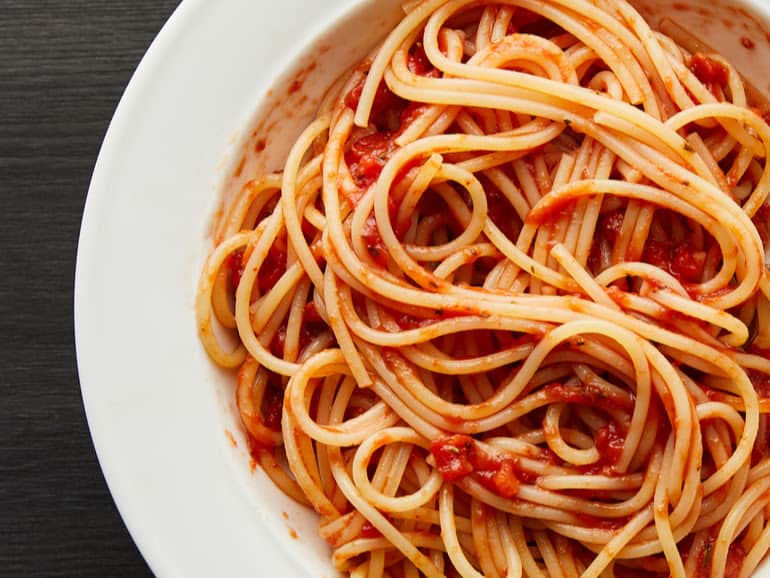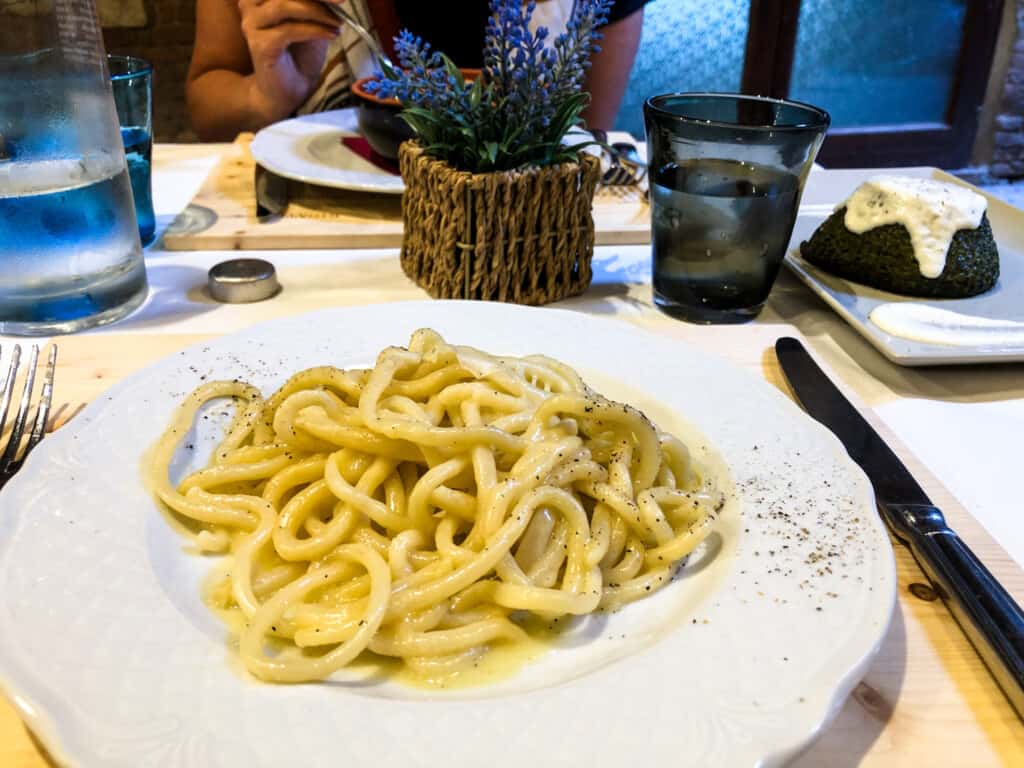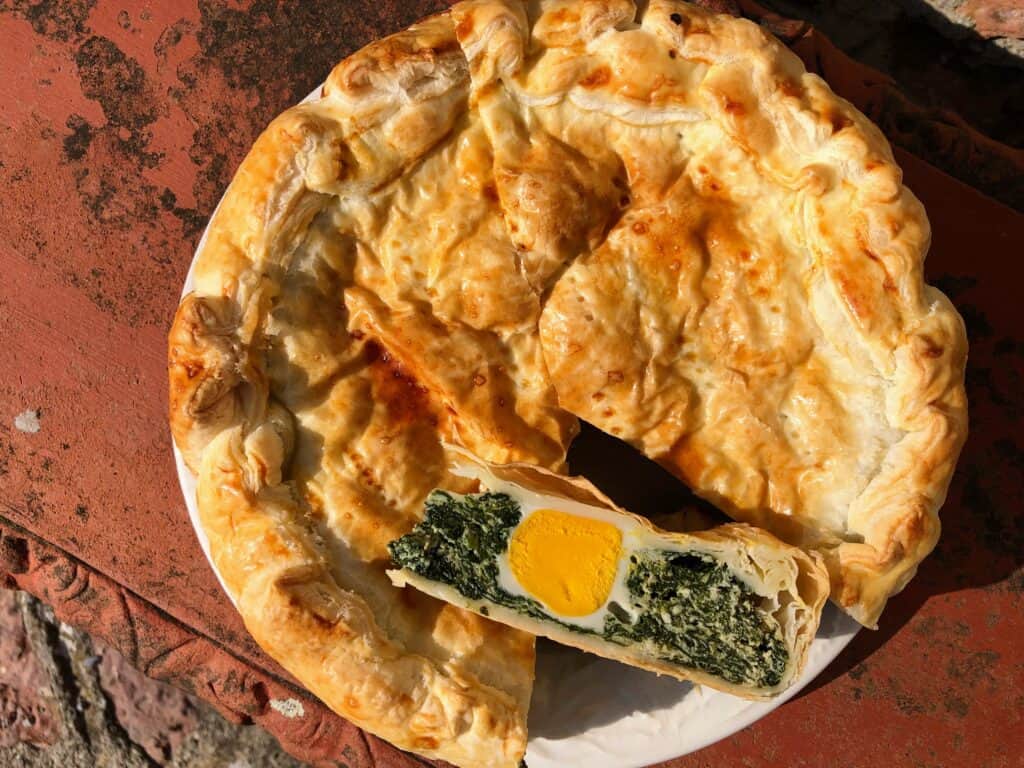Last updated on April 19th, 2024
Are you looking for the best pomodoro sauce recipe? Maybe you are hoping to replicate the unforgettable smell wafting from windows and kitchens on your last trip to Italy?
Homemade pomodoro sauce is one of those things that every Italian family has in their refrigerator, freezer or canned in their pantry for an easy, homemade meal ready in 15 minutes. Every family in Italy has their own recipe and this is mine.
In this recipe, I will walk you through my step-by-step instructions for making my Italian family recipe for the best pomodoro sauce (classic Italian tomato sauce). I will also show you how to spice up your sauce, substitute ingredients and how to cook perfect pasta for your pomodoro sauce.
Jump to Section
Pomodoro Sauce Pronunciation
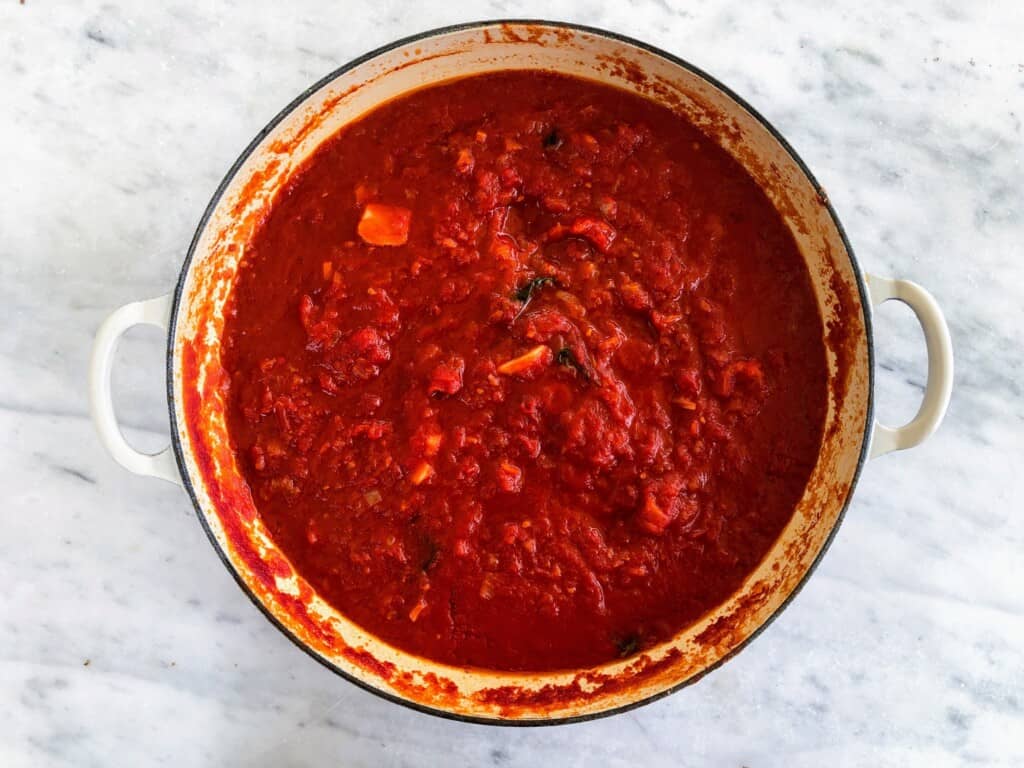
Tomato or pomodoro sauce is pomarola in Italian, pronounced poh-mah-roh-lah.
Listen to the pronunciation of pomarola here:
It’s also called sugo di pomodoro, pronounced soo-goh dee poh-mah-doh-roh.
Listen to the pronunciation of sugo di pomodoro here:
Nice To Know: You will hear the words pomarola and sugo di pomodoro used interchangeably in Italian.
What Is Pomodoro Sauce?
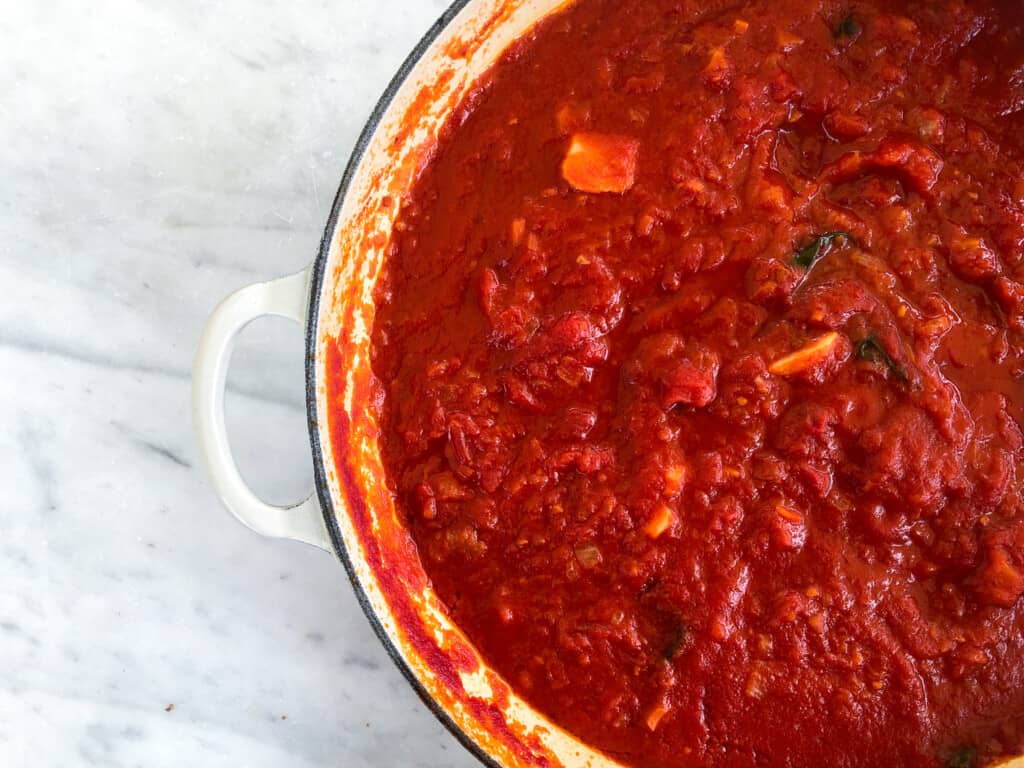
Pomodoro sauce is a simple cooked tomato sauce made with either fresh or canned tomatoes. It starts with a soffritto, a mix of carrot, onion, celery and plenty of olive oil and slowly simmered with tomatoes until thick and rich.
Smooth Or Chunky Pomodoro Sauce
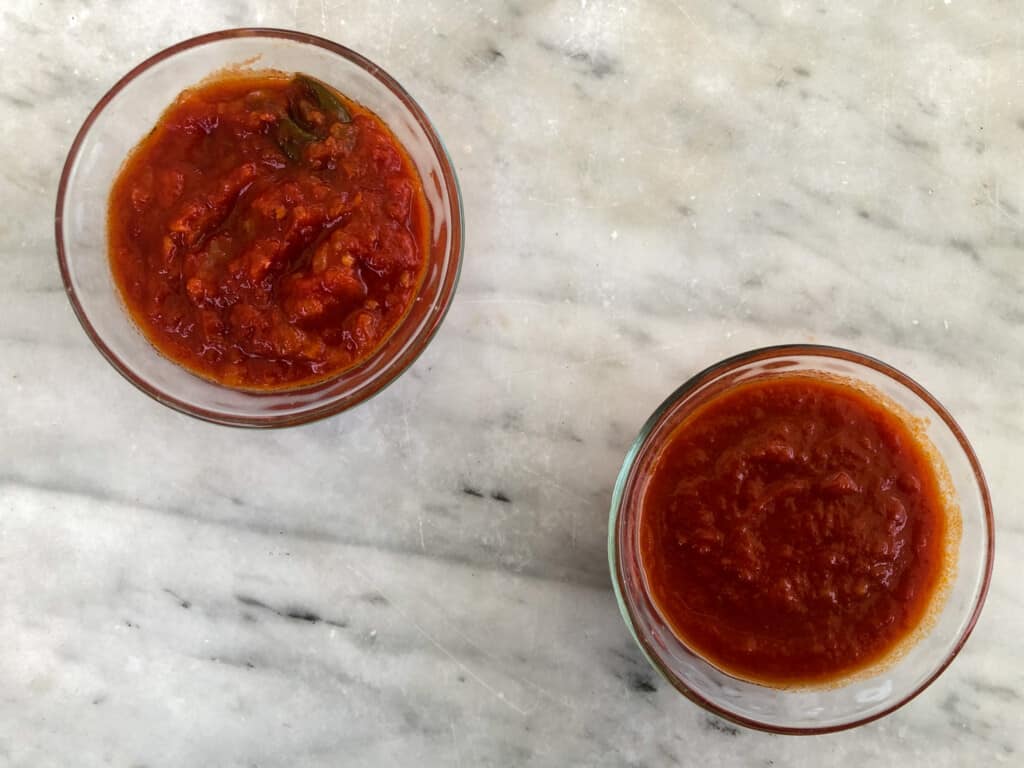
Throughout Italy, the consistency of pomodoro sauce is a personal preference. It’s sometimes smooth, which is considered more delicate and refined but often times, Italians prefer a more full-bodied and rustic sauce, which is chunky.
To achieve a smooth sauce, you will need to strain the sauce, removing all the chunks. This is best achieved with a food mill in my experience. You can also do this by hand with a sieve and a lot of patience.
If you prefer a pomodoro sauce with a little bit more texture, leave the sauce as is after it has been cooked. This way also eliminates a step, slightly increasing the ease of this recipe.
Olive Oil Or Butter In Pomodoro Sauce

The biggest difference in pomodoro sauce recipes is the kind of fat that is being used. Like all Italian recipes, classic pomarola changes from region to region based on what is most commonly used in that area in Italy.
Northern Italy uses a lot more butter than in central and southern Italy because dairy production is huge. Because of this, Northern Italians make their tomato sauce with either butter or a combination of butter and olive oil.
Central and Southern Italy, by contrast, uses only extra virgin olive oil in their tomato sauce because olive oil is one of the most diffused crops. Historically, Italians used what was affordable or what they could produce themselves and for much of Italy, this was olive oil made from their own olive trees.
Try it: My Tuscan family recipe for pomarola uses olive oil but play with both to see which flavor you prefer.
Ingredients
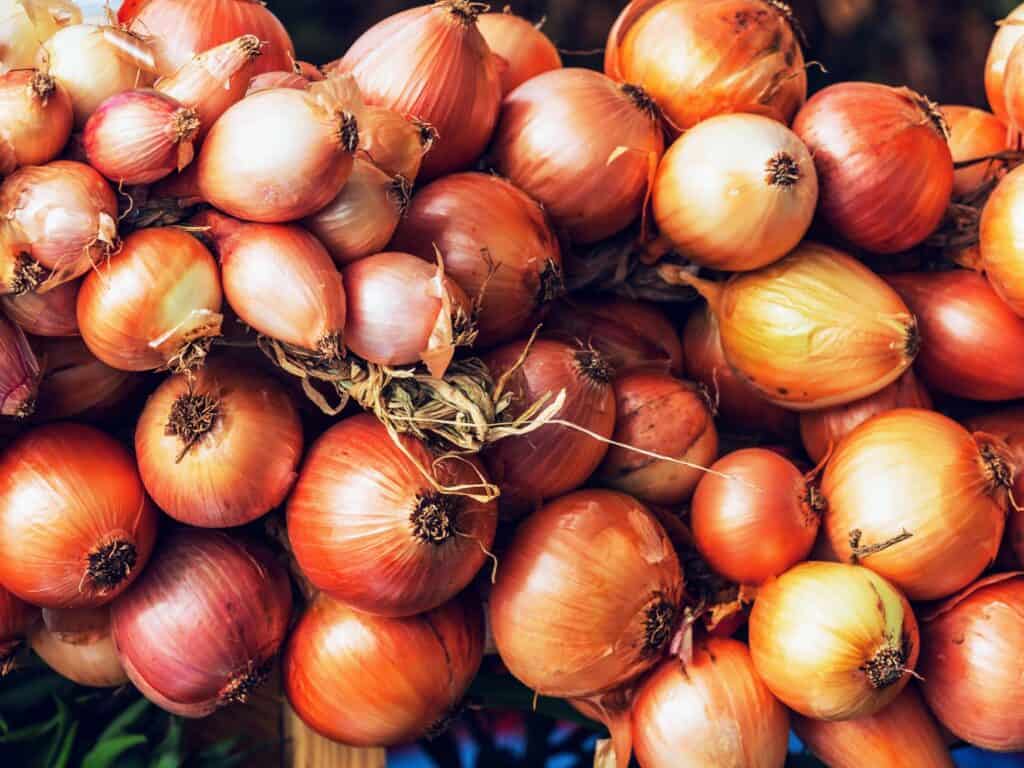
Onion
You can really use any kind of onion you like here. Italians always use what they have on hand or what is seasonal. Leeks or shallots create a lighter tomato sauce while red onions are more aromatic. I prefer yellow onions.
Carrot
A small amount of carrot is added with celery and gently sauteed with the onion in olive oil. This step is crucial to making a good pomodoro sauce.
Celery
Add the same amount of celery as carrot to your tomato sauce.
Garlic
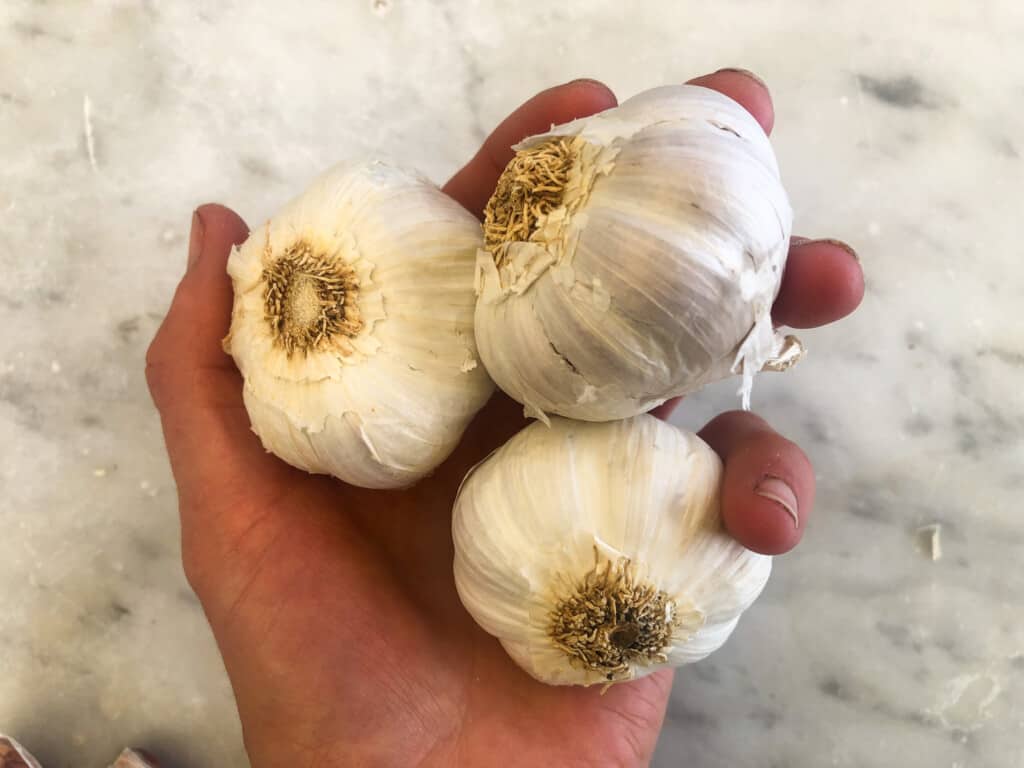
I prefer to leave garlic out of my tomato sauce but it’s very common in many Italian families to add it. Garlic is a strong flavor, adding a lot of body and richness to the pomodoro sauce.
If you decide to use garlic, there are two ways to add it. You can either add it to the soffritto or you can add it with the tomatoes for a more subtle flavor. If you add it to the soffritto, add it in the last two minutes of cooking to prevent burning.
Either way, Italians usually add whole cloves that have been slightly crushed and remove them before serving. This way, you get the aroma of the garlic without the intense, sometimes, overpowering flavor.
Tip: If you’re a big fan of garlic, you’ll love Southern Tuscany’s Aglione Sauce.
Learn More: How to Peel Garlic – Best Easy & Fast Ways + How To Chop And Store It.
Olive Oil
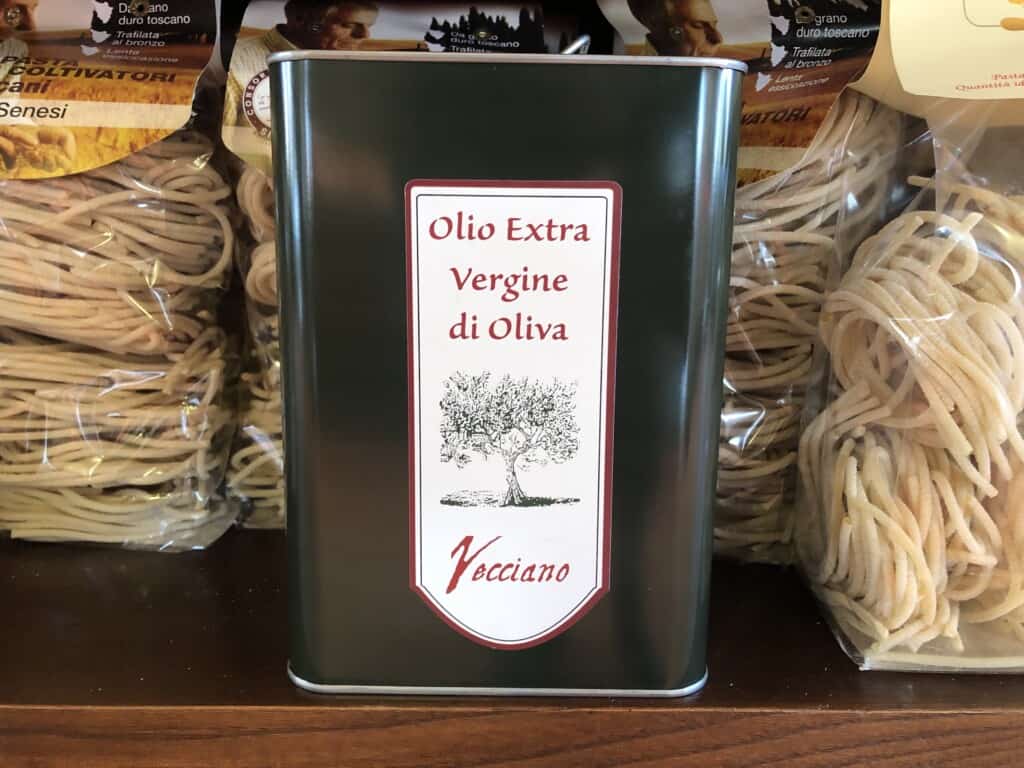
In Tuscany, we use extra virgin olive oil. It’s the best quality of oil, affordable and accessible. Use whatever kind of olive oil this is for you.
If extra virgin olive oil isn’t an option, use olive oil. Avoid canola or corn oils as they are neutral. Part of what makes Italian pomodoro sauce so good is that it’s full of flavor which in part comes from the olive oil.
The other trick to good pomodoro sauce is a lot of olive oil, more than you think you need. ⅓ cup seems like a lot but it’s what gives the sauce its sheen and richness.
Choosing Olive Oil: If you are wondering what the best olive oils are in the US, Best Italian Olive Oil Brands in America – Where to Buy Them and How to Store Them for our top picks!
Tomatoes
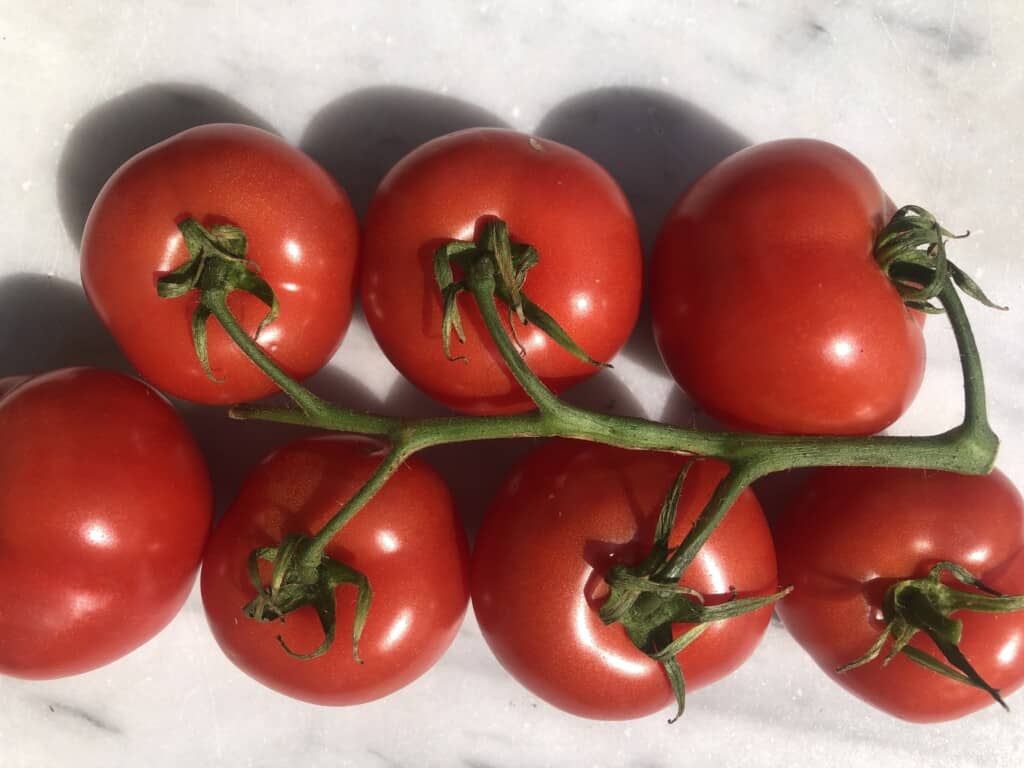
Here in Italy, sun ripe tomatoes are only available from June through mid September. We use fresh tomatoes when we can but for much of the year, we used canned tomatoes, even when making the best pomodoro sauce.
In this recipe, I am showing you how to make pomodoro sauce with canned tomatoes. If you would like to use fresh tomatoes, check out my Italian family recipe for fresh pomodoro sauce.
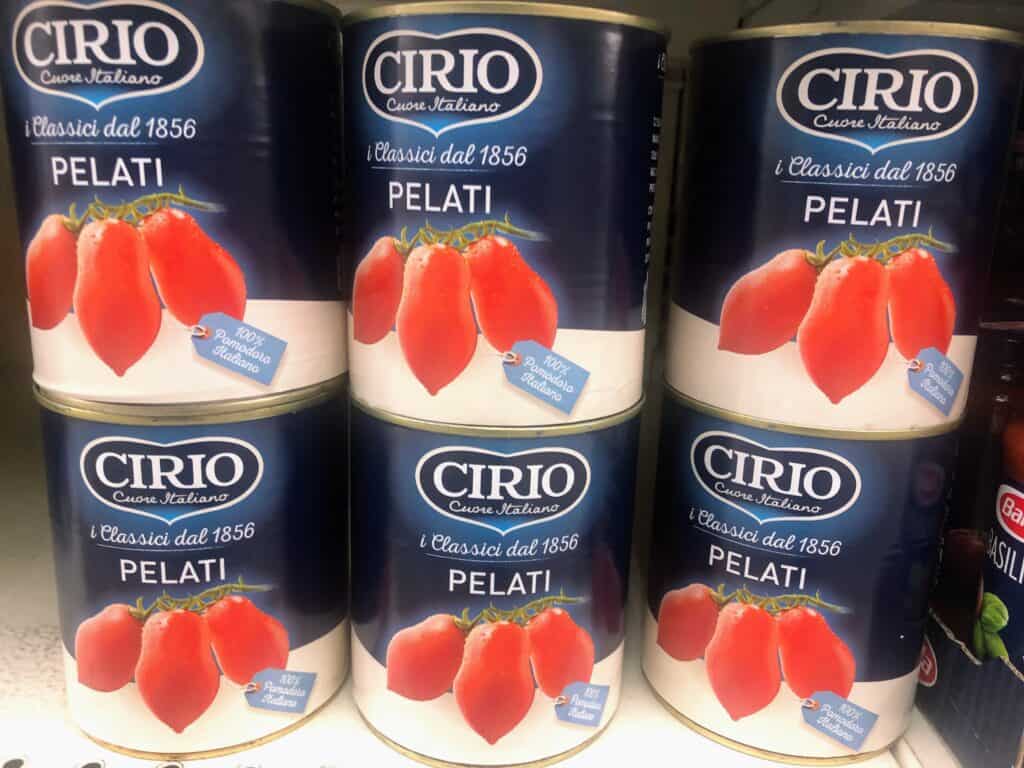
I always use pelati or whole, peeled canned tomatoes but you can use whatever you like, crushed, pureed or small, canned cherry tomatoes are fine as well.
I like pelati because I think they have the best flavor and they end up breaking down into a pulp anyways with the long cooking time.
If you have crushed tomatoes or any other kind, feel free to use that. The final result is going to be more or less the same.
Note: Do not use tomato paste – this is not how Italian tomato sauce is made. Tomato paste is used in other dishes such as ragù or meat sauce.
Sugar
Have you wondered if Italians actually put sugar in their tomato sauce? In pomodoro sauce made with canned tomatoes they literally just add a pinch to balance out the acidity of the tomatoes but no more!
Basil
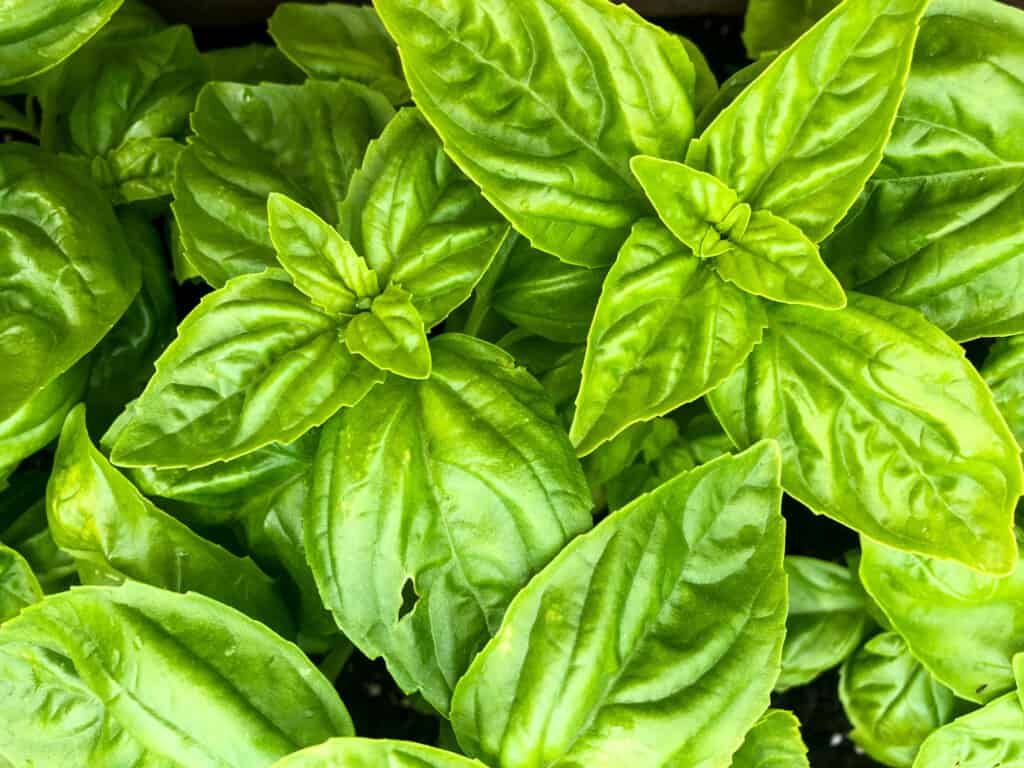
Fresh basil is key to making authentic Italian pomodoro sauce. Because we are using canned tomatoes here, this is the element of freshness that is going to brighten up your sauce and make it have that taste of fresh, summer flavor.
I do not recommend substituting dried basil.
Red Pepper Flakes
Adding a pinch of red pepper flakes is a classic Italian way to boost flavor to any simple dish. If you like a kick of heat, add a pinch of red pepper flakes to the soffritto in the last 1 minute of cooking.
How To Make Pomodoro Sauce
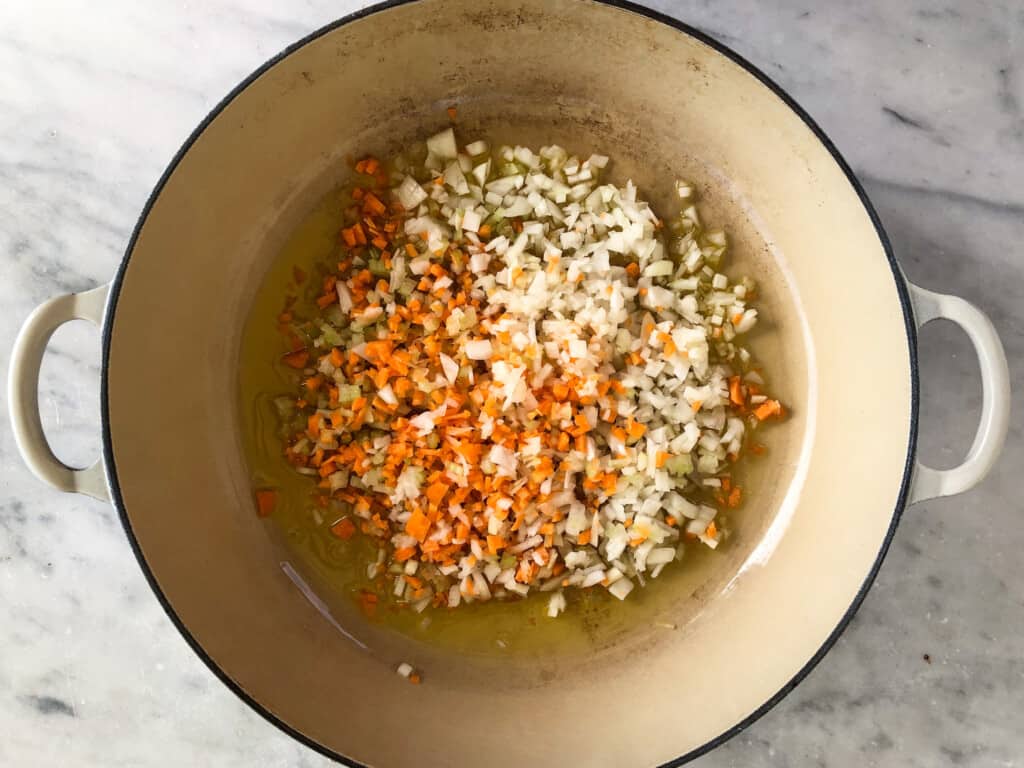
ONE: Heat a pan, preferably heavy-bottomed or enameled cast iron skillet, over medium heat with the olive oil. Finely chop the onion, carrot and celery and add to the olive oil. Sauté the soffritto, stirring occasionally for 15-20 minutes until the vegetables are translucent.

If you have decided to use garlic, add it to the last two minutes of cooking. If you are adding red chili flakes, add them to the last minute of cooking.
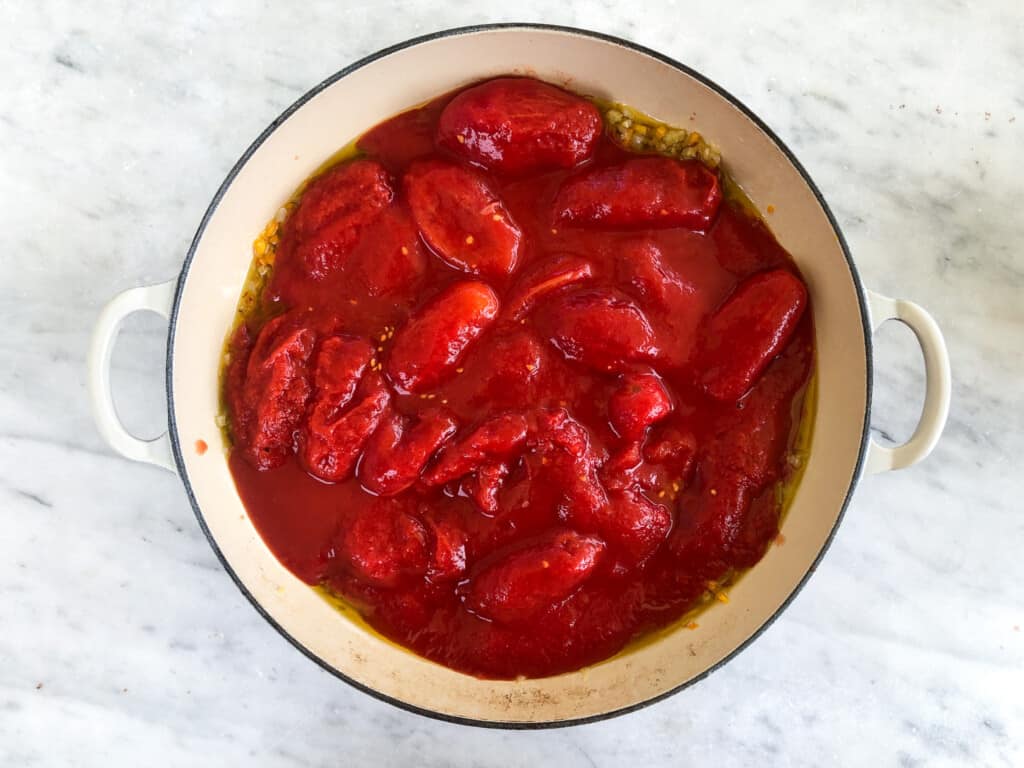
TWO: Add the canned tomatoes with 1 cup of water and bring to a simmer. Gently simmer over low heat, uncovered until thickened and dark red, stirring every so often. This can take anywhere from 1 hour but up to 3 hours. The longer you cook it the better (Italians cook their sauce all afternoon if they have time). Add extra water if you notice the sauce is sticking to the bottom or becoming too thick. The amount of water you add will depend on your heat source and for how long you are cooking the pomodoro sauce.
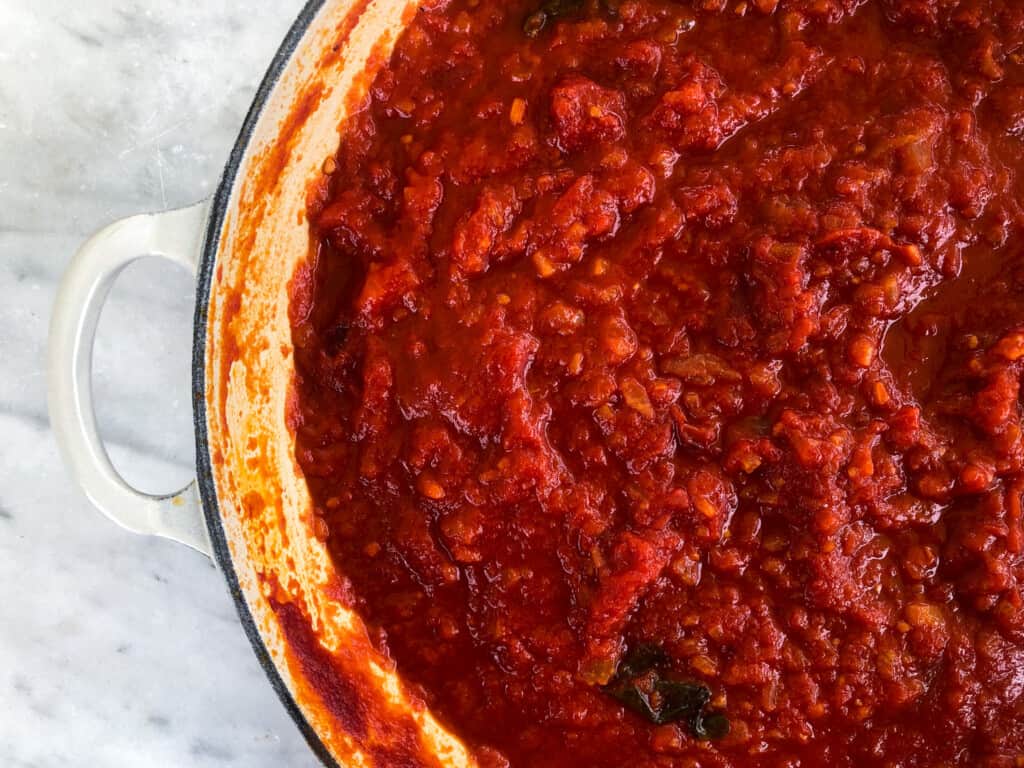
THREE: Add 10-15 fresh basil leaves in the last 15 minutes of cooking.
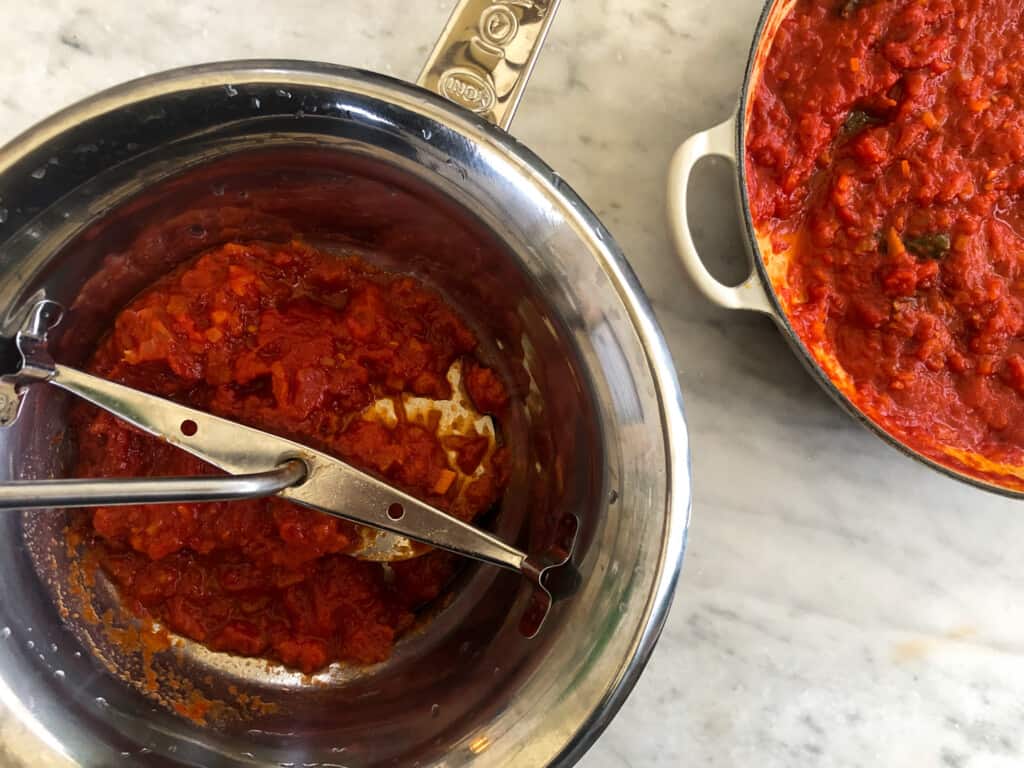
FOUR: Using a food mill, strain your tomato sauce for a smooth, uniform texture. If you prefer a more full-bodied pomodoro sauce, leave as is and either freeze, can or refrigerate when cooled to room temperature.
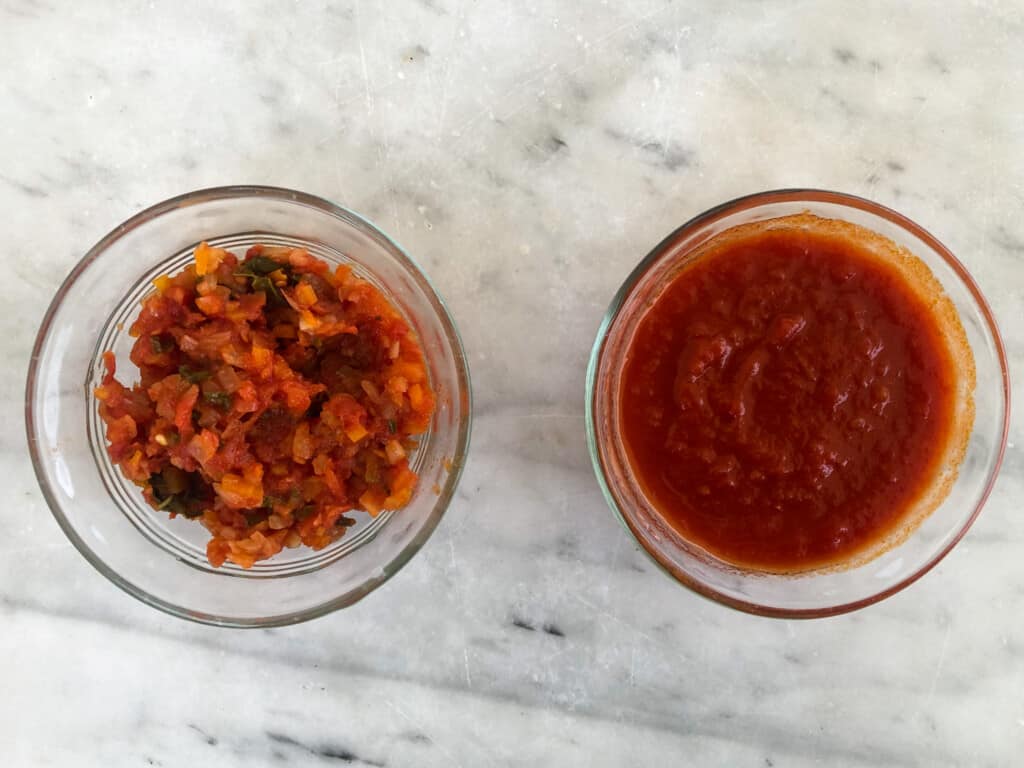
Best Pomodoro Sauce Substitutions
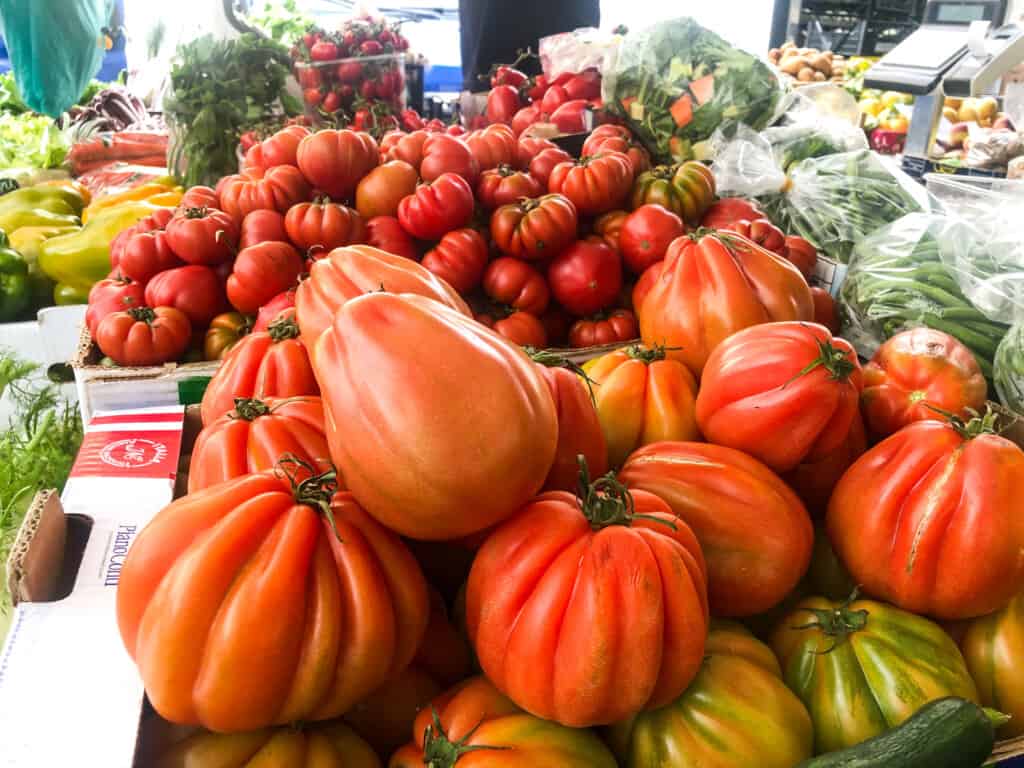
- Use any kind of onion in equal amount instead of yellow onion such as red, white, leek or shallot
- Do not substitute dried basil for fresh basil. If fresh basil is’t accessible, leave it out.
- Add a small handful of finely chopped parsley to the soffritto (this is common in rural areas of Italy).
- Use fresh tomatoes instead of canned, being sure to add cooking time if they are particularly juicy. Remove the stems and roughly chop, adding all the tomato juice as well as the flesh. In this case, skip the water to begin with and only add if you notice the sauce is getting too thick and sticking to the bottom.
- Use butter instead of olive oil in equal parts. Alternatively, use a combination of butter and olive oil, substituting half of the olive oil with butter.
- Use olive oil instead of extra virgin olive oil if that is what you have.
How To Serve Pomodoro Sauce

Italians use pomodoro sauce over freshly cooked al dente pasta. Italians often finish their pasta dishes on the stovetop, lightly heating the sauce with the actual pasta. Read more about cooking pasta in How To Cook Pasta Like an Italian – Step-by-Step.
- Cook pasta according to packaged instructions al dente.
- Meanwhile, gently warm the pomodoro sauce in a wide skillet over low heat.
- Drain the pasta and add to the skillet with the tomato sauce.
- Cook an additional 1 minute until the pasta is fully coated with the sauce, stirring often. This helps the pomodoro sauce stick to the starch of the pasta.
- Serve immediately with freshly grated parmesan cheese.
Fact: Italians never serve the pasta and the sauce separately. Pasta dishes will always come to the table already dressed in their pasta sauce. Read more about Italian pasta etiquette here.
Helpful Tip: Don’t waste that delicious sauce! Learn how and when to fare la scarpetta!
What Kind Of Pasta To Use With Pomodoro Sauce

Pomodoro sauce is one of the few Italian pasta sauces that can be paired with almost any pasta shape or variety. There are some homemade pasta shapes such as trofie or orecchiette that are better suited for regional sauces but on the whole, pomodoro sauce works with fresh, dried or whole wheat pasta.
These are the most common pasta shapes used with pomodoro sauce:
- Spaghetti
- Penne
- Mezze maniche
- Maccheroni
Notes and Tips For Making The Best Pomodoro Sauce
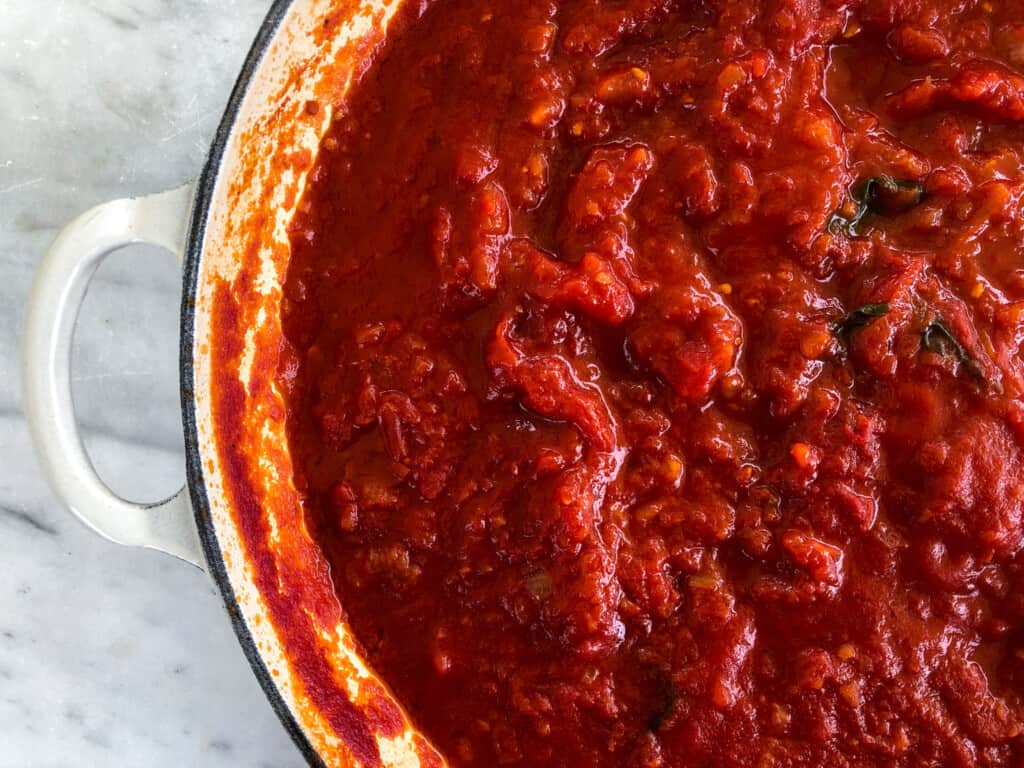
- Be careful not to burn the soffritto or garlic, if using.
- Keep the pomodoro sauce simmering gently and slowly. You do not want a rapid simmer or it can dry out too quickly.
- Stir the pomodoro sauce from time to time to keep it from sticking.
- Don’t be afraid to add more water if it’s sticking to the bottom of the pan. It’s normal to add different amounts of water (it depends on the heat, tomatoes used and cook time).
- Consider doubling or tripling the recipe. In that case, use an extra large pot with high sides.
Learn a Trick: Read The Secret Ingredient That Takes Any Pasta Sauce to the Next Level.
How To Store Italian Tomato Sauce
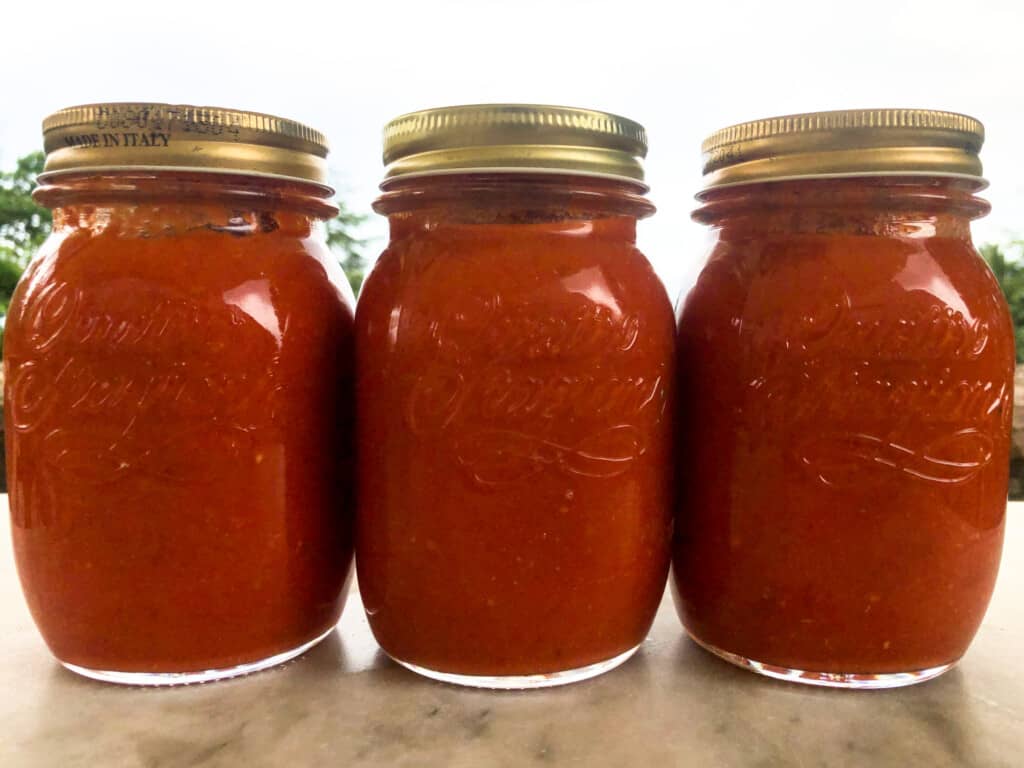
No matter how you decide to store your pomodoro sauce, you need to allow it to cool down to room temperature before storing.
Refrigerating Pomodoro Sauce
Pomodoro sauce can be refrigerated for up to 1 week. Let it come down to room temperature before storing in an airtight container.
Freezing Pomodoro Sauce
Pomodoro can be frozen in individual airtight containers for up to three months. I like to portion the pomodoro sauce out into dinner-sized batches, enough for about 1 lb or package of pasta.
Canning Pomodoro Sauce
Canning pomodoro sauce is one of my favorite ways to store it long term, especially if I am making pomodoro sauce from fresh, summer tomatoes.
Canning does take more time and effort as you need to sterilize and process the cans correctly for safe food storage but frees up a ton of freezer space and I can easily make huge batches of pomodoro sauce to be used all year-round.
Do you enjoy making and eating Italian pasta? If so, check out these recipes:
Orecchiette Pasta Recipe
Pici Pasta Recipe – How To Make Tuscany’s Hand Rolled Spaghetti
Tagliatelle Recipe + How to Pronounce It
Cacio e Pepe Recipe – Pronounce it and Make it Like an Italian (+ Audio)
Fresh Pomodoro Sauce Recipe – An Italian Summer Tradition
Pomodoro Sauce Recipe – Made With Canned Tomatoes
Creamy Kale Pasta Recipe
Italian Kale Pesto Recipe
Aglione Sauce Recipe
Pappardelle alla Boscaiola Recipe

Pomodoro Sauce
Ingredients
- 1 onion medium
- 1 carrot
- 1 celery stalk
- 1/3 cup olive oil extra virgin
- 10-15 fresh basil leaves
- 1-2 cloves garlic optional
- pinch red chili flakes optional
- 2- 28 cans whole crushed peeled tomatoes
Instructions
- Heat a pan, preferably heavy-bottomed or enameled cast iron skillet, over medium heat with the olive oil. Finely chop the onion, carrot and celery and add to the olive oil. Sautèe the soffritto, stirring occasionally for 15-20 minutes until the vegetables are translucent.
- If you have decided to use garlic, add it to the last two minutes of cooking. If you are adding red chili flakes, add them to the last minute of cooking.
- Add the canned tomatoes with 1 cup of water and bring to a simmer. Gently simmer over low heat, uncovered until thickened and dark red, stirring every so often. This can take anywhere from 1 hour but up to 3 hours. The longer you cook it the better (Italians cook their sauce all afternoon if they have time). Add extra water if you notice the sauce is sticking to the bottom or becoming too thick. The amount of water you add will depend on your heat source and for how long you are cooking the pomodoro sauce.
- Add 10-15 fresh basil leaves in the last 15 minutes of cooking.
- If you like a smooth pomodoro sauce, strain the pomodoro sauce with a food mill. If you prefer a more full-bodied pomodoro sauce, leave as is and either freeze, can or refrigerate when cooled to room temperature.
Notes
- Be careful not to burn the soffritto or garlic, if using.
- Keep the pomodoro sauce simmering gently and slowly. You do not want a rapid simmer or it can dry out too quickly.
- Stir the pomodoro sauce from time to time to keep it from sticking.
- Don’t be afraid to add more water if it’s sticking to the bottom of the pan. It’s normal to add different amounts of water (it depends on the heat, tomatoes used and cook time).
- Consider doubling or tripling the recipe. In that case, use an extra large pot with high sides.
Pomodoro Sauce FAQ
Yes, you can and I recommend you do. Once you have everything out for chopping, it only makes sense to chop a bit more and make at least a double batch. I always make huge batches of pomodoro sauce in the summer with vine ripe tomatoes and use it for the entire year. In this case, use a very large pot.
Marinara sauce in Italian is a raw sauce enhanced with olive oil and dried oregano used to make pizza (or pinsa). Pomodoro sauce is cooked with soffritto and used to dress pasta.
A bolognese sauce is a tomato-based meat sauce from Emilia-Romagna. A pomodoro sauce, also known as pomarola, is a simple tomato sauce made throughout the entire Italian peninsula. Pomodoro sauce is vegetarian while bolognese sauce is not.
Pomodoro is the Italian word for tomato.
You can freeze pomodoro sauce for up to three months as long as it’s in an airtight container.
You can absolutely use fresh tomatoes instead of canned as long as you consider the cooking time to account for extra juicy tomatoes. The juicery they are, the more liquid you will need to slowly simmer away.
